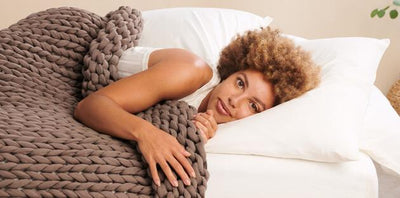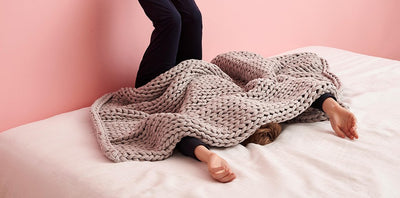Causes and Tips for When Your Back Hurts After Sleeping
If your back hurts after sleeping it may be due to an underlying medical issue like slipped discs, sprains, or strains. Many people also wake up with discomfort as a direct result of the way they slept as the wrong mattress or sleep posture can put pressure on the back overnight

Bearassentials
Back pain is sometimes a result of medical problems, but it can also be a simple matter of poor sleeping posture.
Medium-firm mattresses may be the best option for lower back pain, and pillows can also help support the spine.
Strengthening exercises and stretches are also helpful for those with back pain.
Did you know?
Raising your legs while laying down helps with lower back pain by rotating the pelvis into a more comfortable position. This eases the burden on the spine, allowing it to maintain its subtle curve.
Is rolling out of bed in the morning becoming the biggest hurdle in your day? Does it feel like your hips and spine grew a layer of rust overnight?
Your back may hurt after sleeping for a variety of reasons. From medical conditions like herniated discs to poor sleeping habits, everyone has a slightly different trigger.
For most people there’s a path back towards regaining morning mobility and reducing pain. Some may involve changing the way you sleep. Some could involve changing what you do in your waking hours.
What Is Back Pain?
There are a couple of main ways that back pain tends to show itself: through nerve pain near the spine and via the muscles in the area. In either case, the pain may be sharp or dull. Long-lasting or acute. It could also be in a specific spot or it could spread all throughout the back and even down the legs.
Sometimes the cause of this discomfort is obvious. You may have injured yourself in an accident or while exercising and noticed the pain immediately.
Other times the pain may creep up on you over time, especially when it’s the result of weakness in the core muscles or a posture-related issue.
There are plenty of other causes on top of that, too.

Medical Causes of Lower Back Pain in the Morning
Sometimes back pain doesn’t come as a result of an outside force. Or if it does, a chronic condition can sometimes develop down the line.
In other cases, the discomfort can come as a result of deeper issues, some of which are out of your hands.
Herniated Discs
Between each vertebrae in the spine there are tiny squishy discs whose main job is to absorb shocks from running and jumping. Sometimes, these discs pop out further than they should, causing painful contact with surrounding nerves. This is often the result of an accident or poor exercising form.
These discs often jump back into their little hiding places to do their jobs properly again, but sometimes they continue to stick out, causing painful contact with the nerves around them. This can often lead to sciatica.
Degenerative Disc Disease
Not as much of a disease as it is a fact of life, degenerative disc disease is another common cause of back pain. As we get older, so do the discs in our spine. In some people this can lead to a condition similar to arthritis.
Patients commonly feel aches and pains in the affected area, whether that’s the lower or upper back. This pain can then spread outward to the limbs and even cause numbness.
Fibromyalgia
Women tend to be more at risk of developing fibromyalgia, but men can be impacted by it, too. It’s a condition that causes pain and can also make existing pain feel worse, and it could be one reason your back hurts after sleeping.
Scientists don’t know the exact cause of fibromyalgia, but one of the theories is that it starts with traumatic or repetitive injuries.
Other Medical Causes
There’s no shortage of other medical issues that could cause your back to hurt after sleeping. Here are a few of the other possibilities:
- Obesity that forces the spine and back muscles to over work.
- Weakened back muscles, common with sedentary lifestyles.
- Sprains and strains from repetitive or sudden lifting.
- Tumors

Why Does My Back Hurt When I Wake Up?
Whether or not a doctor has diagnosed you with a specific medical condition, you may find yourself doing the robot each morning as you dance around back pain. One of the reasons for this is a lack of blood flow from movement to the area. This can make existing problems even worse come morning.
With that said, if your back is hurting when you wake up, there’s often a specific factor making the pain worse than it needs to be.
Poor Sleep Posture
Ever woken up from a great nap on the couch only to find your neck in knots and a line of drool down your face? Something similar can happen at any point along the length of the back if your sleeping posture isn’t right. This adds extra pressure to the spine and back muscles that are suddenly called on for movement in the morning.
Here are a few of the positions that could be making your back worse off:
- Sleeping face up with the legs flat on the bed. Those with herniated discs especially tend to find this position difficult as it bends and compresses the lumbar spine.
- Sleeping on your side with one leg crossing over the other. This twists the spine and can cause the lower back to hurt after sleeping.
- Sleeping on your stomach. You may want to avoid stomach sleeping in general, and it can be much worse with pre-existing back conditions.
Unsuitable Sleep Setup
Staying in the right shape during sleep is only half the battle. Getting the right bed is another. A 2021 study found that medium-firm was the best fit for those dealing with back pain.
Those attempting to sleep sitting up in a chair or elevated bed may also be making their back pain worse as it forces a slumped position that can be hard on the lumbar spine.
Lastly, your head pillow may not be the right size for you. If that’s the case, it could be one of the reasons your upper back hurts after sleeping.
Tight or Fatigued Muscles
Put in a long day of work involving twisting and lifting? Even if you felt okay when you went to bed you may end up out of sorts in the morning because your muscles and tendons were strained or sprained. Tightness in those areas can also get worse overnight as the body remains in the same position and the muscles shorten.
Medical Conditions
There’s a pile of evidence that points to people with certain conditions feeling the worst in the morning. A 2008 study found that morning muscle stiffness was particularly prevalent in fibromyalgia patients. A separate study from 2012 found lumbar disc degeneration and morning back pain were strongly correlated.
If you have something wrong with your back, there’s a good chance that mornings will be the most painful part of the day.
Prevention Tips for Back Pain After Sleeping
For those with sensitive backs, it’s not all bad news. There are a handful of prevention measures that can be taken to loosen things up come morning.
The first step in prevention is to have your back looked at properly by a medical professional. They can diagnose existing issues and help put you on a path to recovery. Most importantly, they can give you rehabilitation exercises tailored to your specific needs.
For duller, chronic back pain you may want to take a look at your posture. Spending too much time in the waking hours slouched at a desk or on a couch can lead to mounting problems.
Got your waking life sorted out? Then it’s time to look to the bedroom.
Changing to a mattress that better suits your needs can be a good start. Medium-firm is one of the better options for those battling back pain, but the choice can be highly personal. Side sleepers, especially, may prefer a softer setup.
Aside from the bed itself, pillows can also be a big help. Body pillows like our Cuddler are ergonomically designed and made of supportive Melofoam, making them ideal for spine support regardless of your sleeping style.
Bolster pillows like our Cuddling can also work well as lumbar support during the day and even at night. If your lower back hurts after sleeping, trying a pillow might give you the support you’re looking for.
Treatment for Morning Back Pain
All the prevention in the world may not help in some rare cases. For those people there are a few main treatment options:
- Pain medication to limit the symptoms in the morning
- Traction tables and devices to relieve pressure on damaged discs
- Morning stretches like cobra and cat-camel (sometimes called cat-cow)
Finally, one of the best treatments of all is to strengthen your body.
Exercises for Back Pain
It’s not a bullet-proof strategy, but if you can buff up the muscles in your abdomen and back with safe exercises it may help those whose lower or upper backs hurt after sleeping. For those with lower back issues, the McGill big three could help.
Dr. Stuart McGill, a former professor at the University of Waterloo, found that these three exercises were the safest rehab exercises that also improved pain the most:
- Bird-dog. Great for improving lower back and glute strength (something that is also frequently weak in those with lower back pain).
- Curl-up. Not to be confused with the sit-up, the curl-up strengthens the abs without risking lower back injury.
- Side plank. A classic move for boosting the muscles along the side of the torso.
There are many great tutorials online that go through each move in detail.
Finally, if you’re having trouble with the upper back, doing face pulls can improve posture and pain in the upper back.
Conclusion
If your back hurts after sleeping it could be the result of medical conditions like herniated discs. But for many people the culprit might be a simple case of sleeping in poor positions.
Swapping out a stiff old mattress for a medium-firm one and trying out body pillows like the Cuddler or bolster pillows like the Cuddling can improve morning symptoms. Add a good exercise program on top and you could be waving goodbye to that pesky back pain







